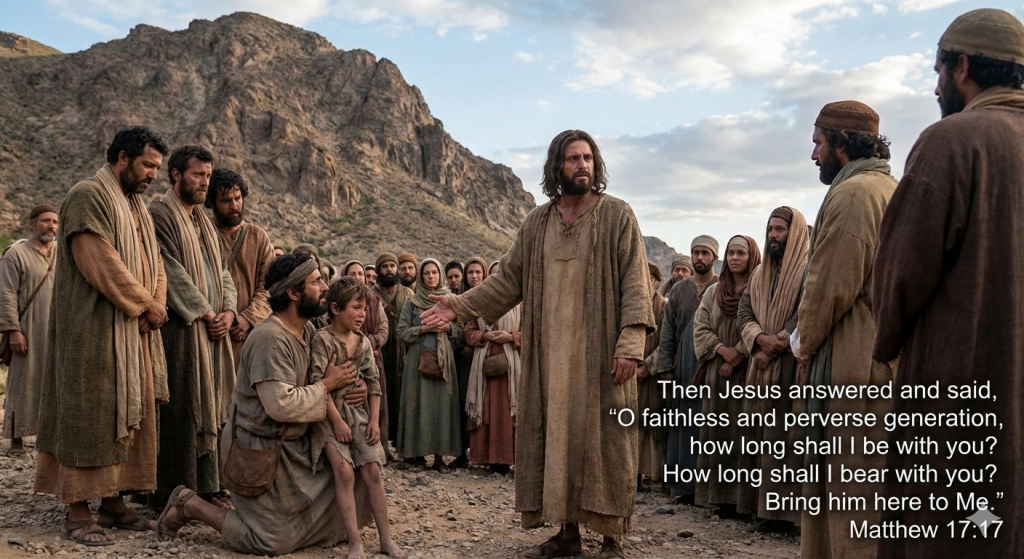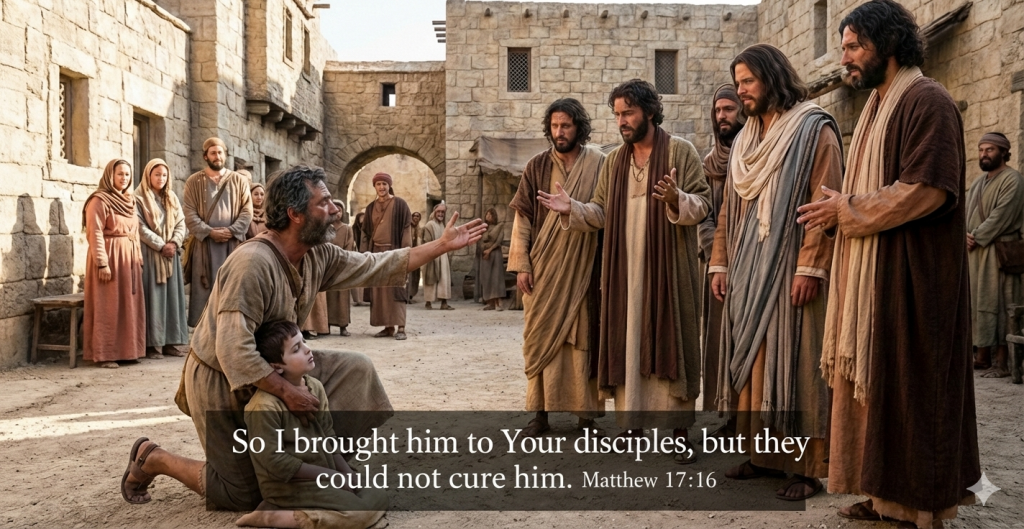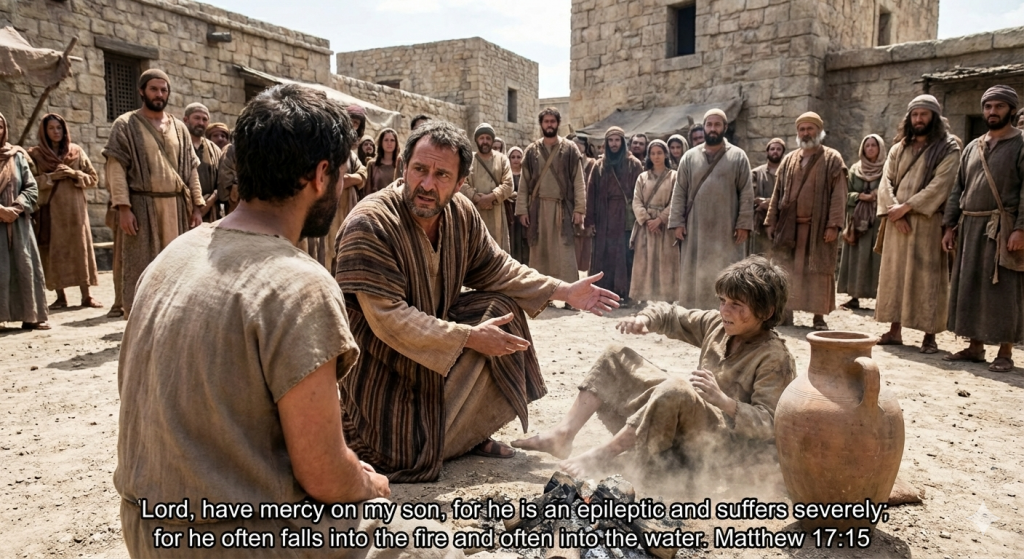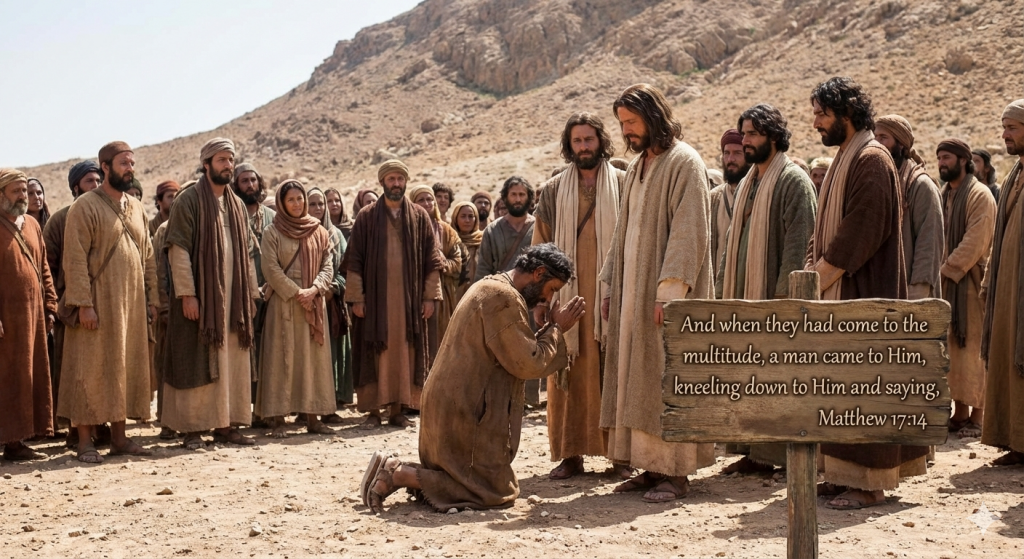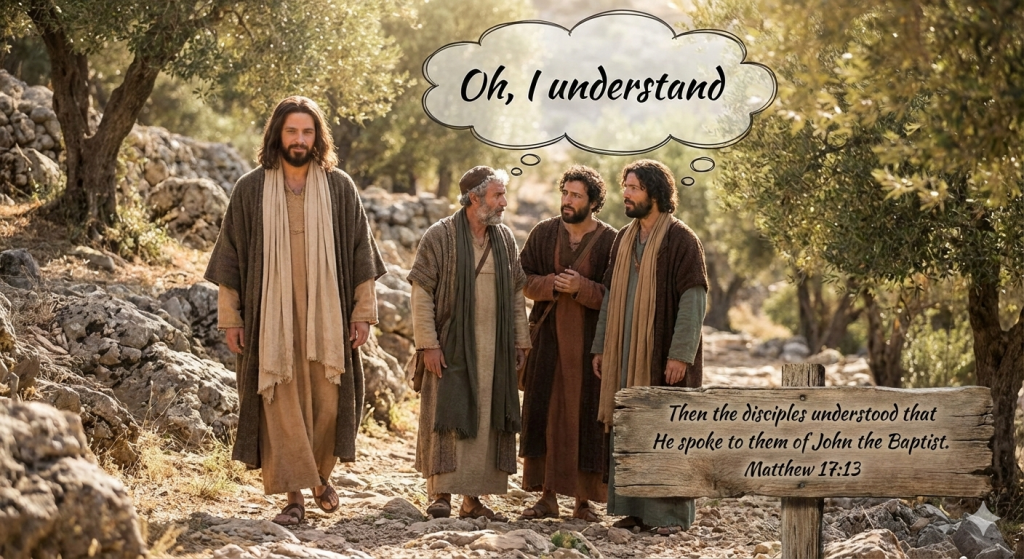Tuesday, 3 March 2026
Then Jesus answered and said, “O faithless and perverse generation, how long shall I be with you? How long shall I bear with you? Bring him here to Me.” Matthew 17:17
Note: You can listen to today’s commentary courtesy of our friends at the “Bible in Ten” podcast. (Click Here to listen).
You can also read this commentary, scrolling with music, courtesy of our friends at “Discern the Bible” on YouTube. (Click Here to listen), or at Rumble (Click Here to listen).
“And Jesus, answering, He said, ‘O! Generation disbelieving and having been mangled! I will be with you until when? I will uphold you until when? You carry him here to Me’” (CG).
In the previous verse, the father of the moonstruck boy told Jesus that he brought the boy to His disciples, but they could not heal him. Matthew next records, “And Jesus, answering, He said, ‘O! Generation disbelieving and having been mangled!’”
Two new words are seen here. The first is the adjective apistos, which is derived from the negative particle a and pistos, faithful or believing. Thus, it signifies unbelieving. The second is the verb diastrephó. It is derived from dia, through, and strephó, to twist. Thus, it signifies thoroughly twisted.
A word that gets the sense is mangle. It is as if everything expected of the generation had been clenched in the hands of time and been so warped that nothing of what was originally intended is seen. The use of the perfect participle (having been mangled) indicates that this is how it has been since some point in the past, and it continued to be that way even since Jesus’ coming. Essentially, they had learned nothing from His ministry. He continues, saying, “I will be with you until when?”
If nothing had been learned to this point, there was much to do to untangle the deformity of the people. This would be inclusive of the scribes who stood there accusing the disciples, as well as the disciples themselves.
By this time, Jesus had performed innumerable miracles. Along with that, His words of wisdom and His perfection before the law should have been sufficient to convince them of the divine nature of His ministry.
But unless their instructors, both Israel’s leaders and His disciples, could unite in agreeing that He was truly from God, He would have to continue to instruct them. Therefore, He restates the sentiment, saying, “I will uphold you until when?”
Another new word is seen, the verb anechó. It is derived from ana, up, and echo, to hold. Thus, it is the act of upholding. He questions how long He would have to carry the burdensome weight of their unbelief, along with their twisted views concerning the things of God. As a sort of poke at them based on this clause, He says, “You carry him here to Me.”
In other words, “If I have to keep upholding you, you might as well do the little you are qualified for and carry the boy to Me.” It is an ironic poke at all of them for not having the faith to do what they had been instructed and an opportunity to see how God can, in fact, untangle things that are a result of the consequences of sin.
Life application: The fact of the matter, based on Jesus’ questions, is that those in attendance were never capable of upholding their responsibilities, even to the time of, and after, His crucifixion. Thomas proved that his faith was lacking even when the other apostles told him that Jesus had been resurrected. He needed sight to validate what his cold heart could not accept by faith.
Without the coming of the Spirit, things would have very quickly devolved into a total lack of cohesion, and the faith would have died out. Likewise, both Israel and the world have continued in a mangled state, even to this day. The church has marched along, often its own worst enemy. Israel has continued without Jesus and in a state of rejection because of it.
Only those who have been saved and sealed with the Spirit are capable of properly continuing the cause of Christ. However, unless they are willing to apply themselves, learn what Scripture teaches, and then act in accord with it, they will remain just as mangled as the rest of the world in their thinking and actions.
Jesus’ rebuke was directed to those around Him, but the truth of His words is not limited to the moment in which He spoke. The seven letters to the seven churches in Revelation clearly show that this is true.
Let each one of us do our best to help direct the world and those around us to a right and proper understanding of what Christ has done and how it impacts, and will impact, everything around us. This is our calling, and it all begins with faith. Ground yourself in the faith of Jesus Christ and then go forth in that state.
Glorious Lord God, how desperately the world needs You. If Israel couldn’t carry the message properly, and if the church continues to fail at it, then this should alert us that we need to renew our thinking, directing it to Your word, and then conforming our thoughts and intents to honor You. Help us in this, to Your glory. Amen.

